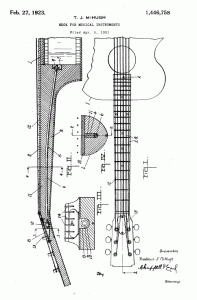In this series of posts, we feature various U. S. patents from the last 150 years, which were either historically significant in the development of modern musical instruments and instrument-building methods, or which present something interesting or just plain cool. We hope that these historical curiosities will help give cigar box guitar builders some context for their work, and hopefully also provide some inspiration.
This patent was filed in 1921, and published by the U. S. Patent and Trademark office in 1923. It is historically significant because as far as we can tell, this is the first registered patent for an adjustable steel truss rod in a guitar (if you know of an earlier one, please let us know in the comments and we’ll check it out!). The inventor is listed as Thaddeus J. McHugh, of Kalamazoo Michigan, “assignor to the Gibson Mandolin-Guitar Company.”
The adjustable steel truss rod was a major innovation in guitar manufacture, and most electric and acoustic guitars today include them. Being able to make fine adjustments to the bow of the neck, and thereby adjust the string action of the instrument, is now considered to be an integral part of guitar maintenance.

From the patent’s text:
The main objects of this invention are:
First. To provide an improved neck for stringed instruments, which is so constructed that it is not likely to sprint or warp under the strains to which it is subjected in use, and one which should it become warped, may be straightened.
Second. To provide an improved neck for stringed instruments which may be adjusted or sprung to adjust or regulate the distance of the strings from the keyboard.
…
By this arrangement of parts, I provide a neck for stringed instruments which is not likely to warp or spring under severe strains, and one which should it become warped or sprung may be readily adjusted to remove the spring, and also to adjust the position of the strings relative to the fingerboard.
…
By this arrangement of parts, I am also enabled to use wood which has not been heretofore considered satisfactory for the manufacture of necks, on account of its not having sufficient strength and rigidity, and further, great care in selecting stock is not necessary.
